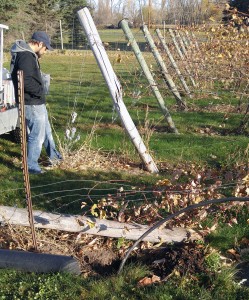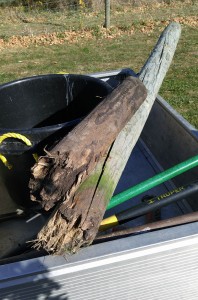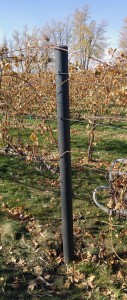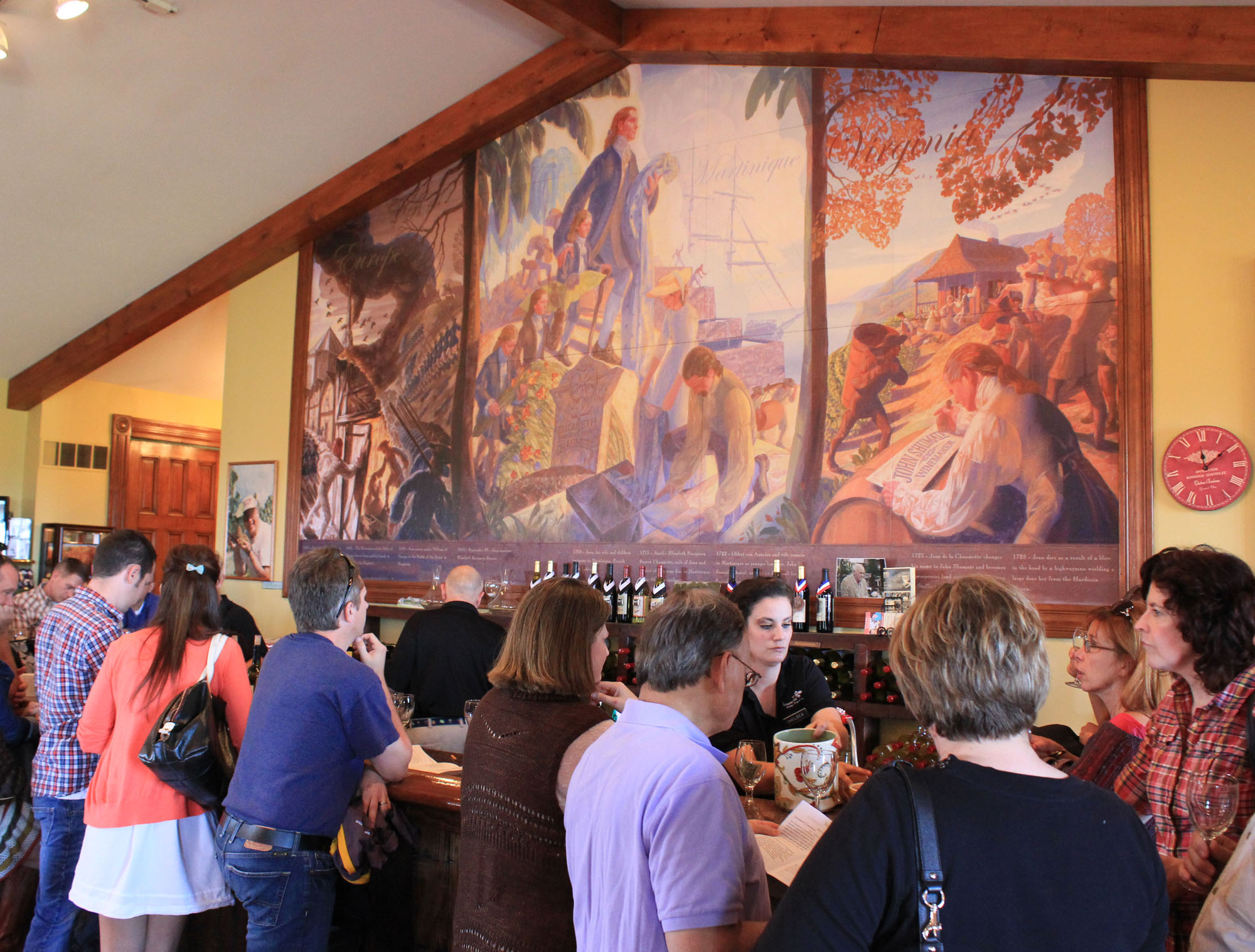Sustainable Solution: Recycled Plastic Vineyard Posts
In the United States, recycled plastic lumber is starting to emerge as a durable and environmentally friendly option for vineyard posts.
Steel or wooden posts are still the norm, but neither are ideal. The humidity and temperature fluctuations across our region mean wooden posts sometimes last only five years. Also, wooden posts are not always sourced from sustainable, plantation grown timber. Then there are the concerns about wood preservative chemicals leaching into the soil.
Steel, while more affordable than wood, can rust even when it’s galvanized, is less aesthetically pleasing and is more vulnerable to blowing over, or even bending, in extreme winds.
See related story: We Need Something Harder Than Wood Trellis Posts
In MWP we’ve discussed concrete as an option for vineyard posts. That story attracted a lot of attention.
Recycled plastic is another credible alternative. Bedford Technology, based in Worthington, Minnesota has made recycled plastic lumber for nearly 20 years for use in playgrounds, marinas and other applications where it can replace wood or steel.

Sam Jennings, winemaker at Round Lake Winery, supervises the installation of a 6″ Bedford recycled plastic post
‘We started doing a bit of research with a local vineyard, Round Lake Winery, in Round Lake, Minnesota,” said Marc Hollahan, Bedford’s sales and market development representative. ‘We went out there to see what kind of headaches they have with wood, which is their existing product. The main issue we found was post failure, in some cases after only eight years.”
Bedford backs their recycled plastic products with a written, 50 year limited lifetime warranty. The recycled lumber is made from a high-grade, hard plastic called High Density Polyethylene (HDPE). Bedford reuses the plastic from products like milk jugs, laundry detergent jugs and shampoo bottles and combines it with a fiberglass strand for added strength. In their typical plastic post the company says the recycled content is extremely high.
Hollahan says, while the plastic material is more durable than wood, it can be cut and shaped just like lumber.
‘It’s versatile, so in a vineyard environment you can use it in multiple configurations. As far as attaching the trellis wire or the T-Bar to the top of it, if you’re doing a double curtain, that’s totally up to you how you want to do it,” he said. ‘You can cut it like wood, you can drill through it like wood, you can screw into it and you can nail into it, although with nailing we do recommend pre-drilling.” The pre-drilling is recommended for both nailing and screwing into the plastic to ensure a longer fastener life.
Bedford’s product already comes in shapes and sizes suitable for vineyard posts but as a manufacturing facility they can easily adapt it to custom shapes and sizes.
The plastic is more flexible than steel or wood which is helpful in strong winds that can blow over trellises made from the latter materials. ‘Don’t get me wrong, it’s [recycled plastic lumber] not going to bend and move around, but that little bit of flex when you get into the high winds may save that post,” said Hollahan.
Just like wood and steel, it’s also able to handle the weight and wire tension of long vineyard rows. ‘We’ve had our engineer go through and do all the calculations with wind load and stresses with the tension of the wire on our post. Often you can use a smaller profile post of ours rather than the larger profile wood,” said the Bedford sales rep.
Despite using inorganic material, the lumber is surprisingly environmentally friendly. On top of being a recycled product, Bedford says the plastic is very stable and inert and doesn’t absorb chemicals or deteriorate from exposure to them, so there’s no leeching of chemicals into the soil. The product is also completely recyclable: Bedford can grind up old plastic posts and use the plastic again.
The recycled plastic lumber is also a fit for US Department of Agriculture (USDA) organically certified farming. ‘This apple orchard I’m working with locally is all organic and their certifier has basically given us the go ahead to put our product in their organic farm,” said Hollahan, although approval of the plastic posts for organically certified farming should be regarded as on a case by case basis.
Bedford’s recycled plastic posts are about double the cost of using wooden posts, but that’s before longevity, sustainability and long-term profits are factored into the cost equation. The company has completed a cost analysis, based on replacing wooden posts every eight to fifteen years. The analysis found that once the second, replacement wooden post goes in the ground, the plastic posts are saving the vineyard money through factors like eliminating the additional labor and materials required to replace wooden posts.
For the aesthetically conscious vineyard owner, the plastic also looks like wood. ‘I’ve got a six-inch post that I bring as a sample that’s dark brown in color and a lot of the time people think it’s actually made from wood,” said Hollahan. He adds that the material maintains its pleasing appearance and texture, so unlike wood or steel, it doesn’t weather or have appreciative color change with time.
This article was sponsored by Bedford Technology who manufacture recycled plastic products and are based in Worthington, Minnesota.






